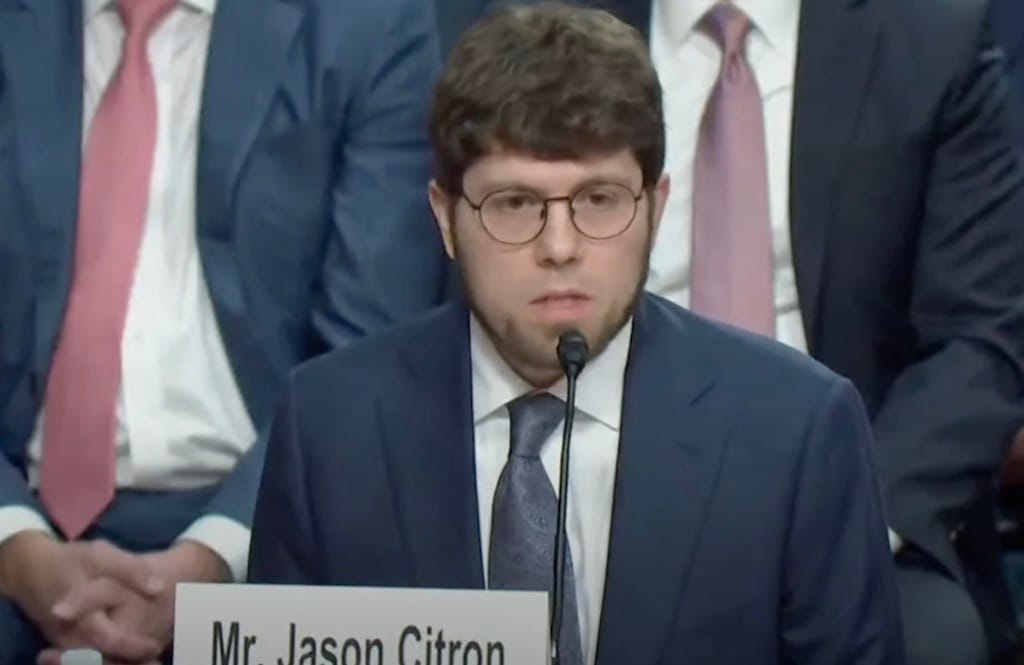Senators Grill Tech CEOs Over Child Sexual Exploitation, Section 230
The CEOs defended their platforms, arguing that they are taking actionable steps to protect minors.
Corey Walker

WASHINGTON, January 31, 2024 – Members of the Senate Judiciary Committee pressed five high-profile social media executives on their efforts to protect minors from sexual exploitation on their platforms during a Wednesday hearing.
Meta CEO Mark Zuckerberg, X CEO Linda Yaccarino, TikTok CEO Shou Zi Chew, Snap CEO Evan Spiegel, and Discord CEO Jason Citron faced withering criticism from the Senate Judiciary Committee that their platforms allegedly allow for rampant child sexual abuse.
The CEOs defended their platforms, arguing that they are taking actionable steps to protect minors.
The notion that users should be allowed to sue tech platforms served as a major theme of the hearing.
Sen. Lindsey Graham, R-South Carolina, dismissed the notion that tech companies are trying their hardest to protect children, and pushed for the elimination of parts of Section 230, a move which would make it easier to sue tech companies over the content allowed on their platforms. He asked Citron point blank if he supported removing Section 230’s liability protections for tech companies. Citron disagreed with a weakening of Section 230.
“If you’re waiting on these guys to solve the problem, we’re going to die waiting,” Graham said.
Section 230, enacted as part of the 1996 Communications Decency Act, frees tech companies of liability for the content their users post on the platform. In other words, social media outlets are not treated as publishers for content on their platforms provided by a third party.
Sen. Amy Klobuchar, D-Minnesota, said she “couldn’t agree more” with Graham and lambasted social media companies for not protecting children and using their algorithms to promote “harmful content” to minors. Klobuchar accused the tech companies of allowing children to access dangerous fentanyl-laced pills and said that 30% of these purchases happen on social media platforms.
“I agree with Senator Graham that nothing is going to change until we open the courtroom doors,” Klobuchar said, “I think the time for all of this immunity is done, because I think money talks even stronger than we talk up here.”
Federal lawmakers have proposed legislation to hold tech companies accountable for the content on their sites. The “Kids Online Safety Act” would hold tech companies legally liable for content presented to minors that harms their mental health. The STOP CSAM Act would allow victims of sexual abuse to sue tech companies. Critics of these bills argue they could infringe upon free expression and potentially lay the groundwork for mass censorship online.
Also, several state legislatures have been proactive in trying to regulate social media consumption by minors.
In March 2023, Gov. Spencer Cox, R-Utah, signed H.B. 311 and S.B. 152, requiring parental approval for minors to access social media platforms with more than 5 million global users and holding platforms responsible for harmful content exposed to minors.
Gov. Sarah Huckabee Sanders, R-Arkansas, followed Utah’s lead, signing Act 689, mandating age verification and parental approval. In May 2023, Gov. Greg Ganforte, R-Montana, signed legislation to ban TikTok on all devices statewide. Federal Judge Donald Molloy blocked the legislation in Nov 2023, arguing that it violated the First Amendment.









Member discussion